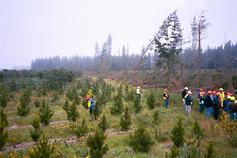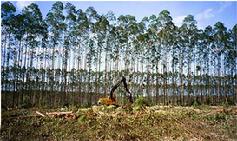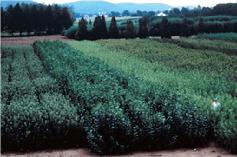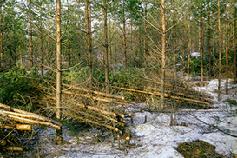This website uses cookies so that we can provide you with the best user experience possible. Cookie information is stored in your browser and performs functions such as recognising you when you return to our website and helping our team to understand which sections of the website you find most interesting and useful.
Workplan
Task 43 – 2022-2024 Workplan
Objective

The objective of Task 43 is to address barriers to sustainably-sourced biomass supply chains by: analyzing and quantifying current opportunities (WP1); improving supply chain efficiencies (WP2); and biohubs for high value, integrated biomass supply in sustainable and circular economies (WP3).
All three work packages involve documenting strategies for adapting biomass supply to support thriving bioeconomies and contribute to multiple SDGs through improved land, forest and materials management providing renewable resources to sustainable and circular economies.
Deliverables

The Task will produce and provide timely and policy-relevant information to targeted audiences, arrange Task-specific events, contribute to important workshops and conferences, and engage in processes that are identified as important in shaping the conditions for biomass supply chain and logistics systems. Scientific publications, policy-relevant reviews, case studies and science and technology briefs on a variety of topics will be published and presented throughout the triennium.
Management
The Task Leader and WP Leaders together with the NTLs constitute the Steering Committee (SC) that approves plans and budgets associated with task activities. The SC builds international and national capacities essential to have credibility in the various biomass supply chain and logistics systems sectors. Task 43 collaborates with other Tasks in intertask projects to integrate biomass supply chain and logistics with energy conversion and end-use, ensuring that analytical and conceptual linkages with markets are strong.
Work scope for the Task period 2022-2024

The Task supports collaborative research to develop and deploy sustainably-sourced biomass for future bio-based products, energy, and fuels. Efforts are placed on integration with sustainable and circular economies to provide reliable biomass supply within with primary production, waste, by-products and residues in line with cascading use of biomass. The Task will:
- Leverage international expertise, explore and promote innovative sustainably-sourced biomass quantification and utilization that contribute to climate action strategiesand efficiently integrate biomass production with sustainable land management systems.
- Enhance biomass supply and pre-processing strategies to support bioenergy within sustainable and circular economies in achieving highest value use, reuse, repurpose, and recycling of biomass resource.
- Foster international collaboration and shared views on strategies to increase the quantity, quality, value, and reliability of biomass supply within biobased economies.
The Task will work exclusively with terrestrial biomass sources including residues, by-products or co-products from forest and agriculture production systems; residues, by-products or co-products from bio-based manufacturing industries; cellulosic biomass from post-consumer waste; as well as dedicated biomass crop systems as part of broader land management strategies. The Task focus will be on integrat

ed biomass supplies and effective capture of biomass resources from waste and residue to meet biomass quantity and quality demands within a growing sustainable and circular bioeconomies.
Work programme
The Task will be delivered through three work packages, each making a contribution to three key focus areas though identification and review of best practices, and are reviewed and promoted through key collaborative approaches within and beyond the Task team. The three work packages are:
WP1 – Analyze and quantify opportunities and innovations for biomass production and sustainably-sourced supplies
WP1 themes and activities:
- Strategies for transition to circular business models that quantify, produce, and expand supplies of sustainably-sourced biomass for bioenergy, while considering cascading biomass use principles.
- Document current best practices and applications for quantifying socioeconomic values of biomass crops and crop residue as a part of a local, regional and national sustainable and circular economy strategies.
Work Package 1 Leader:
Biljana Kulisic
European Commission Directorate-General for Energy
DM 24 6/047
B-1040 Brussels/Belgium
Phone: +32 229-60550
Email: biljana.kulisic@ec.europa.eu
WP2 – Biomass supply and material handling strategies and advanced recovery systems for waste and residue biomass
WP2 themes and activities:
- Case studies in best practice and technology for biomass waste and residue recovery:
a) From primary production (agriculture and/or forestry;
b) From biobased manufacturing industries;
c) From post-consumer (MSW) biomass waste. - Identifying and managing technology bottlenecks in handling a mix of waste/residue biomass and primary sourced biomass.
Work Package 2 Leader:
Dan Bergström
Swedish University of Agricultural Sciences
Dep. Forest Biomaterials and Technology
Skogsmarksgränd
901 83 Umeå
Phone: +46 907868214
Email: dan.bergstrom@slu.se
WP3 – Biohubs for high value, integrated biomass supply in sustainable and circular economies
WP3 themes and activities:
- Improved biomass supply quantity, quality and reliability through effective sustainable and circular economy based biohubs.
- Characterization of biomass (inputs) and commodities (outputs) through innovative biohubs
Work Package 2 Leader:
Cyriac Mvolo
Natural Resources Canada – Canadian Wood Fibre Centre
5320-122 Street, Edmonton
Alberta T6H 3S5
Phone: +1 825-510-1173
Email: cyriac.mvolo@NRCan-RNCan.gc.ca
